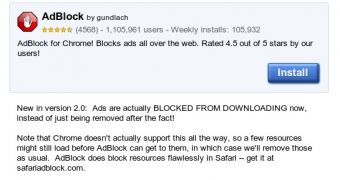Judging by the popularity of the AdBlock extension for Google Chrome, a lot of people don’t like to be flooded with ads when they surf the web. But those that switched from Firefox to Chrome may have noticed that the extension doesn’t work exactly like AdBlock for Mozilla’s browser. The reason is that Chrome doesn’t provide developers with the same API tools so extension creators have to make do with what they can. Luckily, things are improving on this front with a little help from Apple.
The problem is that Chrome’s extension APIs don’t provide any way of blocking a resource before it’s loaded. This means that all the ads on a page are downloaded and rendered, but are then hidden by AdBlock or similar extensions. For most purposes, this works, the ads are gone, but in certain cases you actually get to see the ads before they’re hidden. And the second benefit of using an ad blocker, a smaller memory footprint thanks to less resources being loaded, is gone.
This was a limitation in Chrome and Google hasn’t really done anything to fix it, despite a lot of people asking for it. But extension developers caught a break since Chrome now includes the “beforeload” event which enables them to prevent resources from being downloaded. This capability comes courtesy of Webkit, the rendering engine that powers Chrome, Safari and a sleuth of other web browsers.
AdBlock 2.0 for Chrome takes advantage of this and prevents some, but not all, ads from loading at all. This should make for a better experience for users overall and it’s a solid step forward, but Google still has to implement a few more features for ad blocking extensions to be on par with their Firefox counterparts.
AdBlock is the most popular extension in the Google Chrome gallery, with 1.1 million downloads, and by a significant margin over the Google Mail Notifier extension which has 640,000 downloads. An ‘issue’ has been opened in the Chromium bug tracker to spur Chrome developers into implementing the necessary changes and is currently the most ‘starred’ issue so, clearly, a lot of people care about it.

 14 DAY TRIAL //
14 DAY TRIAL //